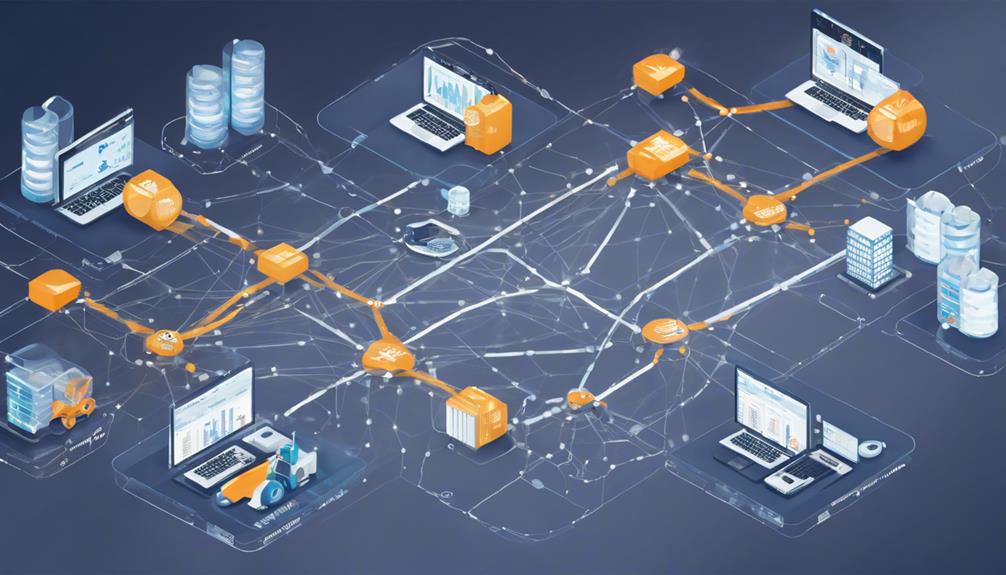In addition, digital twin technology provides enhanced customer satisfaction through proactive maintenance, real-time insights, and personalized experiences. It improves product quality by enabling predictive maintenance, quality control, and performance validation. This technology streamlines time to market with faster prototyping and real-time data utilization. Additionally, it promotes sustainable business practices by reducing environmental impact and optimizing resource utilization. Agile supply chain operations benefit from real-time adaptability and enhanced visibility. Furthermore, digital twins increase operational efficiency by offering predictive maintenance, streamlined processes, and real-time monitoring. These advantages showcase the immense potential and benefits of digital twin technology in enhancing operational processes.
Key Takeaways
- Enhanced predictive maintenance capabilities for improved operational efficiency.
- Real-time performance insights for proactive decision-making.
- Reduced downtime through early issue detection and resolution.
- Improved product quality and reliability through digital simulation.
- Cost-effective testing and prototyping for streamlined time to market.
Enhanced Customer Satisfaction
Within industries utilizing digital twin technology, customer satisfaction is greatly bolstered through proactive maintenance strategies and real-time insights, ensuring streamlined operations and improved communication channels. Real-time monitoring enabled by digital twins allows for personalized experiences tailored to individual customer needs. By predicting maintenance requirements in advance, companies can address issues before they impact customers, leading to smoother customer service interactions. These real-time insights provide better communication channels and problem-solving capabilities, ultimately enhancing the overall customer experience. Repair operations also benefit from digital twins as processes are streamlined, resulting in quicker resolutions for customers. The ability of digital twins to inform future product improvements leads to enhanced customer satisfaction and loyalty. Industries such as aerospace, defense, industrial machine, electrical equipment, and pharmaceuticals prioritize the use of digital twins due to their significant impact on customer satisfaction levels.
Improved Product Quality
Digital twin technology facilitates the enhancement of product quality in industries such as automotive and medical devices by enabling the collection of real-world operational data. By leveraging digital twins, industries can achieve significant improvements in product quality through:
- Predictive Maintenance: Digital twins allow for the prediction of maintenance needs based on real-time data analysis, reducing downtime and enhancing product reliability.
- Quality Control: Through continuous monitoring and analysis of data gathered by digital twins, industries can implement stringent quality control measures, ensuring products meet high standards.
- Performance Validation: Digital twins aid in validating product performance virtually before physical prototyping, enabling companies to identify and rectify potential issues early in the development process, ultimately leading to improved product quality.
Streamlined Time to Market

To expedite product development and market entry, leveraging digital twin technology enables industries to streamline their time to market through continuous performance insights and accelerated innovation processes. Digital twins play an essential role in facilitating faster prototyping by allowing companies to virtually validate product performance before physical prototyping begins. This validation step helps in identifying potential issues early on, leading to quicker iteration cycles and enhanced innovation. By harnessing real-time data from digital twins, companies can validate assumptions swiftly, reducing the time required for product enhancements and modifications. Consequently, the streamlined time to market achieved through digital twin technology translates into faster product launches and improved market responsiveness. Companies that embrace digital twins gain a competitive advantage by accelerating their product development timelines and ensuring that their offerings meet market demands efficiently through performance validation at every stage of the development process.
Sustainable Business Practices
By identifying operational inefficiencies and optimizing resource utilization, digital twin technology plays a pivotal role in fostering sustainable business practices. When it comes to sustainability, digital twins offer significant advantages:
- Environmental Impact: Digital twins drive sustainability efforts by pinpointing efficiency improvements, reducing energy consumption, and minimizing waste generation. This proactive approach not only benefits the environment but also aligns with eco-friendly business practices, enhancing your company's green footprint.
- Resource Optimization: Through digital twins, businesses can boost production capacity without the need for extra resources. This optimized resource utilization leads to cost savings, reduced material waste, and overall improved efficiency. By maximizing the use of existing resources, businesses can operate in a more sustainable manner without compromising productivity or quality.
- Value Chain Sustainability: Industries like aerospace, defense, and pharmaceuticals are leveraging digital twins to enhance sustainability across their entire value chain. This holistic approach ensures that sustainability practices are embedded in every aspect of the business, from production to distribution, fostering a culture of environmental responsibility and resilience.
Agile Supply Chain Operations

Incorporating agile supply chain operations into your business strategy enhances responsiveness and adaptability within the interconnected network of suppliers and distributors. By leveraging digital twins, you gain real-time adaptability and supply chain visibility, allowing you to make informed decisions promptly. Digital twins offer a thorough view of your supply chain, enabling you to manage lead times effectively and guarantee timely delivery of products and services. When disruptions occur, digital twins empower you to address them swiftly, minimizing operational impacts and maintaining customer satisfaction levels.
In the current landscape, characterized by post-COVID-19 challenges and geopolitical uncertainties, the agility and resilience provided by digital twins are invaluable for managing supply chain operations efficiently. These digital replicas also offer insights that enable you to increase production capacity without requiring additional resources, promoting operational efficiency and sustainability. Embracing agile supply chain operations supported by digital twin technology equips your business with the tools needed to navigate uncertainties and drive success in a dynamic environment.
Increased Operational Efficiency
Utilizing digital twin technology allows for real-time monitoring of components, assets, and processes, leading to heightened operational efficiency. By harnessing the power of predictive maintenance and remote monitoring, digital twins offer a multitude of benefits:
- Predictive Maintenance: Digital twins enable the prediction of potential issues before they arise by continuously analyzing real-time data. This proactive approach reduces downtime, prevents costly breakdowns, and enhances overall operational efficiency.
- Remote Monitoring: With digital twins, you can remotely oversee operations, troubleshoot problems, and make informed decisions from anywhere in the world. This capability not only saves time and resources but also ensures that processes run smoothly, optimizing operational efficiency.
- Streamlined Processes: Integrating digital twins with other Industry 4.0 technologies streamlines design and development processes. This seamless integration enhances collaboration, boosts productivity, and fosters innovation, ultimately contributing to increased operational efficiency.
Frequently Asked Questions
How Does Digital Twin Technology Impact Cybersecurity Measures?
When considering cybersecurity implications, digital twin technology plays a significant role in monitoring network vulnerabilities and implementing data protection strategies. This technology aids in identifying potential threats and vulnerabilities, allowing for proactive security measures. By creating virtual replicas of physical assets, digital twins assist in testing security protocols and responses to cyber attacks. Implementing digital twins can improve incident response times and reduce the impact of security breaches.
Can Digital Twin Technology Be Applied to Non-Manufacturing Industries?
In healthcare applications, digital twin technology offers a platform for virtual modeling and real-time monitoring. Smart cities integration leverages digital twins for infrastructure optimization and resource management. Non-manufacturing industries like healthcare and smart cities benefit from data-driven insights and predictive capabilities. Implementing digital twins in these sectors enhances operational efficiency and decision-making processes, showcasing the versatile applications of this technology beyond traditional manufacturing domains.
What Are the Potential Risks Associated With Implementing Digital Twin Technology?
When it comes to implementing digital twin technology, you may encounter various challenges. These can include issues related to data integrity, where maintaining the quality and accuracy of data throughout the lifecycle poses a significant hurdle. Ensuring that your team is well-trained to effectively manage this technology is vital. Additionally, compliance with data privacy regulations is essential to avoid potential risks and setbacks in your implementation process.
How Does Digital Twin Technology Handle Data Privacy Concerns?
To address data privacy concerns, digital twin technology employs robust data encryption methods. By implementing strong encryption protocols, sensitive data within digital twin systems remains secure. Access control mechanisms are essential in regulating who can view or modify data, enhancing privacy protection. Organizations can use encryption and access control to maintain data privacy standards and comply with regulations like GDPR and HIPAA, ensuring the security of digital twin applications.
Are There Any Legal Implications of Using Digital Twin Technology?
When using digital twin technology, legal considerations are paramount. Ensuring compliance with data privacy laws, like GDPR, is vital to avoid liability concerns. Inaccurate data or flawed decisions based on digital twin information could lead to legal repercussions. It is essential to define and protect intellectual property rights associated with digital twin designs and data ownership. Clear contractual agreements outlining responsibilities, liabilities, and ownership rights are necessary for a smooth implementation process.
